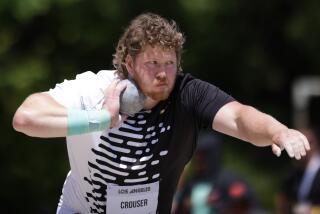Sprinter Gatlin Fails Doping Test
- Share via
Justin Gatlin, the 2004 Olympic gold medalist who earlier this year tied the world record in the 100-meter dash, failed a doping test, testing positive April 22 for testosterone at the Kansas Relays, the sprinter acknowledged Saturday.
Gatlin’s disclosure came two days after the sports world was rocked by the announcement of an initial irregular test result involving Tour de France champion Floyd Landis, who has denied misconduct. In Gatlin’s case, backup tests have already confirmed initial irregularities; he insisted Saturday he had “never knowingly used any banned substance.”
The one-two hammer involving two of sports’ most prestigious figures -- the Tour de France champion and the world’s fastest man -- raises questions about whether the so-called “war on drugs” in sports has faltered and, for that matter, can ever be won.
Doping-related challenges remain persistent and far more extensive than many casual fans might want to believe in any number of professional and Olympic sports, including Major League Baseball, cycling and track and field.
“Anybody with an IQ over room temperature should have been able to figure this out, that doping is pervasive across all sports,” former Penn State professor Charles Yesalis, one of the nation’s leading anti-doping experts, said Saturday in a telephone interview.
Dick Pound, head of the World Anti-Doping Agency in Montreal, said that “clearly, sports officials on their own are unable to deal with the problem.”
The only recourse, Pound said, is an aggressive partnership along the lines of the 50-50 structure WADA has developed “involving sport and the public authorities,” meaning government and law enforcement.
Pound added, “It’s the only way we’re going to get out of this.”
Peter Ueberroth, chairman of the USOC and a former baseball commissioner, said in a statement, “We have reached a tipping point in the fight against doping in sport.” He added, “The cold reality is this: We are not yet winning the battle, and if we are ultimately to succeed, we must become smarter, more efficient and more effective in our efforts.
“The status quo will not work.”
Asked how Gatlin could have tested positive, his New York attorney, Cameron Myler, said, “That’s the question we’re all trying to figure out at this point.”
Asked, too, about the timing of his disclosure, she said, “Of course it’s not ideal timing, with the news about Floyd.”
The announcement Saturday seemed particularly stunning in light of Gatlin’s leading role as part of a new vanguard of U.S. track and field athletes who, arriving on the scene in force at the 2004 Games, had brought the promise of international success without the taint of drugs.
Gatlin regularly spoke to youth groups about the dangers of doping. When asked at meets, he insisted athletes could win without cheating.
Just last month, at the U.S. national championships in Indianapolis, he said, referring to the current crop of U.S. standouts, “When we came on the scene in 2003, when we were babies, that was a dark age,” the onset of the BALCO scandal that has since led to sanctions against more than a dozen track and field stars.
“The first questions we were asked was, ‘So, what do you think of this latest drug scandal?’ Now we talk about how we can make things better for the sport and how we can make it better for the people who come in behind us.
“We want to make a name for ourselves in a positive way.”
At that same meet, he also said, “My e-mail is always full of messages from kids, and I’m always responding. Helping these kids get to the next level is a very big responsibility for me. I want to help show them the way, so they don’t use performance-enhancing drugs, testosterone and all those other things.”
USA Track & Field officials -- who for years have fought a perception overseas that top American stars are too often fueled by illicit substances -- issued a statement Saturday saying the organization was “gravely concerned” by Gatlin’s positive test.
The failed Kansas test came just weeks before Gatlin tied the world record in the 100 meters, 9.77 seconds, a race run May 12 in Doha, Qatar. The record was first set on June 14, 2005, by Jamaican Asafa Powell, running in Athens.
Gatlin was not notified until June 15 that initial tests on the urine sample he provided April 22 had tested positive, Myler said Saturday, which explains why Gatlin was able to run in Qatar and through the U.S. nationals in Indianapolis.
Knowing when he raced in Indianapolis that he soon might be fighting a formal doping offense, Gatlin nonetheless won the 100 in 9.93 seconds.
Track and field fans worldwide had, with an added intensity since the Doha race in May, been clamoring for Gatlin to race against Powell. But Gatlin, since the U.S. nationals, decided that “until this got resolved it would be best for him not to run,” Myler said.
Follow-up tests also came back positive for testosterone, she said. Notification came about July 12, she said.
It remains unclear why the process carried on for nearly two months. Tests were conducted at the WADA-accredited lab at UCLA.
U.S. Anti-Doping Agency officials, who would prosecute a doping case, could not be reached Saturday for comment.
A specialized test, called a carbon isotope ratio analysis, proved the testosterone came from outside his body, Myler said. Notification of that result also came about July 12, she said.
The French newspaper L’Equipe reported Friday that the same test showed evidence of synthetic testosterone in Landis’ system. He was notified last week of an “unusual level” in the ratio of his testosterone to another substance, epitestosterone.
In Landis’ case, notification was based on readings obtained from initial tests performed on a urine sample Landis provided July 20, after his stirring Stage 17 breakaway through the Alps, a ride that set him in position to win the Tour. His backup sample is due to be tested in the coming days.
Landis has said he expects the backup sample to come back with an irregular reading as well.
Gatlin is further along in the process. His initial and backup work, which were performed on what are called “A” and “B” samples, have come back positive for testosterone, and the carbon test has proven the substance was synthetic.
Pound observed, “If all the tests have been completed and are positive, it seems to me he doesn’t have anywhere to go. One assumes USADA will follow its normal process.”
Gatlin has a prior positive test on his record, in 2001, testing positive for an amphetamine contained in a medicine he had been taking since childhood for attention deficit disorder. On appeal, international track and field officials reduced his two-year suspension to one year.
He then went on to win the 100 meters in Athens in 9.85 seconds, adding a bronze medal in the 200 meters in 20.03 and a silver in the 400-meter relay. In 2005, Gatlin won the 100 and 200 at the world championships.
He is only the fourth 100-meter sprinter in history, along with Americans Carl Lewis and Maurice Greene and Canadian Donovan Bailey, to hold a world and Olympic championship and a 100-meter record.
Because of the 2001 test, however, Gatlin now faces the prospect, if found liable now of a doping violation, of a lifetime ban.
Despite Gatlin’s emergence as a spokesman for clean racing, suspicion had still lingered, in part because of his coach, Trevor Graham, who in 2003 sent a syringe containing a designer steroid to USADA, triggering the BALCO investigation.
Graham has coached at least a half-dozen athletes sanctioned for doping use, including Tim Montgomery, who was suspended last December and stripped of the 100-meter world record, 9.78 seconds, that he held from 2002 until Powell’s race in 2005.
Graham also used to coach Marion Jones, winner of five Olympic medals, three gold, at the Sydney Games in 2000. She has consistently denied the use of illicit performance-enhancing substances.
The New York Times reported July 20 that Graham is under investigation by federal authorities in connection with the BALCO matter.
Gatlin, speaking to Sports Illustrated in May, said, “I understand what it would mean to track and field if I ever tested positive or went down in some scandal. At this point that would be one of the hardest hits the sport could take.”
*
(BEGIN TEXT OF INFOBOX)
Ups and downs
* Tested positive for an amphetamine at the 2001 U.S. junior championships. The drug was contained in prescription medication he had been taking for 10 years to treat attention deficit disorder.
* Won Olympic 100-meter gold medal in 9.85 seconds at the 2004 Athens Games.
* Thought he had set the 100-meter world record with a time of 9.76 seconds at a meet in Doha, Qatar, in May 2006. Five days later the sport’s world governing body amended the time to 9.77, the mark set by Asafa Powell.
* Issues a statement Saturday saying he tested positive for “testosterone or its precursors” after a race in Kansas City.
*
Source: Reuters
**
Other cases
Several prominent track and field athletes have been involved in drug scandals in recent years. Here are a select few:
* Ben Johnson: Stripped of his 1987 world record for the 100 meters and gold medal in the same event in the 1988 Seoul Olympics after testing positive for an anabolic steroid.
* Linford Christie: Won gold in the 100 meters at the 1992 Barcelona Olympics and the 1993 world championships. Tested positive for nandrolone in 1999.
* Tim Montgomery: Set a world record of 9.78 seconds for the 100 meters in 2002. He was stripped of the record and received a two-year, doping-related ban from competition in 2005.
* Kelli White: Won two gold medals in the 100 and 200 meters at the 2003 world championships. She was stripped of those medals and given a two-year suspension after acknowledging use of banned substances.
*
Sources: Los Angeles Times; cnnsi.com; usatf.com; bbc.com
More to Read
Go beyond the scoreboard
Get the latest on L.A.'s teams in the daily Sports Report newsletter.
You may occasionally receive promotional content from the Los Angeles Times.






